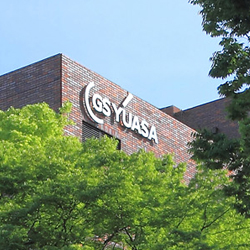Respect for Human Rights
We believe that respect for human rights is an essential foundation
for achieving sustainable growth and a sustainable society.
Management That Takes Human Rights into Consideration
Fundamental Approach to Respect for Human Rights
Respect for human rights is a cornerstone of the GS Yuasa Group’s business activities, and we are cognizant that preventing the occurrence of human rights violations in Group decision-making and activities is a key element of management. Moreover, we conduct business on a global scale, and for this reason, we believe that proper management of human rights issues is crucial not just for GS Yuasa and its Group companies, but also in our relationships with domestic and overseas suppliers and other business partners.
The Group’s fundamental approach regarding respect for human rights is expressed in the president’s policy (CSR Policy), which is the foundation for the CSR activities of the entire group, and we make employees aware of this policy. In addition, we undertake human rights risk management by conducting human rights due diligence in accordance with the Guiding Principles on Business and Human Rights (referred to as the “Guiding Principles"), which are international norms on human rights. In the Group, the Sustainability Promotion Committee, which promotes Group-wide sustainability initiatives, manages key human rights issues as part of the implementation of human rights management, and the Board of Directors supervises the status of initiatives addressing human rights issues.
Legal systems relating to human rights have been established in Japan and other countries in recent years, and corporate measures regarding human rights issues has become a matter of considerable stakeholder interest. The Group not only complies with human rights laws and regulations, but also supports international human rights norms and frameworks (including the International Bill of Human Rights, International Labour Organization (ILO) Core Labour Standards, and Guiding Principles) and continuously improves its initiatives for undertaking business activities that take human rights into consideration. We also clearly convey our expectations regarding human rights to all interested parties and implement measures that encourage action in line with those expectations.
Policy on Respect for Human Rights (excerpted from the CSR Policy)
2. Respect for Human Rights
GS Yuasa will respect all human rights and fundamental labor rights, and will not tolerate any forced labor or child labor.
Refer here for Sustainability Promotion FrameworkIdentification of Human Rights Issues
The GS Yuasa Group identifies human rights issues that pose human rights risk in collaboration with outside experts so that we can conduct proper management of those risks (the risks of direct and indirect human rights violations arising from business activities). When identifying human rights risk, we take the following into consideration.
- Human rights issues that require management by a manufacturing business that is active on a global scale
- Setting the scope of application to persons subject to impact on human rights throughout the value chain (not limited to employees, but also including supplier workers, local residents, customers, users, and others)
- Complicity in human rights violations that occur in the supply chain (contributing to human rights violations)
- Examples of human rights risks that have occurred in other companies
The GS Yuasa Group ascertains its impact on human rights and appropriately addresses identified human rights issues through ongoing communication with all interested parties.
Human rights issues that may be impacted by our Group business activities
Please scroll sideways
| Human rights issues | Persons impacted by human rights | ||||
|---|---|---|---|---|---|
| Suppliers | Employees | Local residents | Customers, users | Local communities | |
| Forced labor | ● | ● | |||
| Child labor and dangerous work that puts young workers at risk | ● | ● | |||
| Long working hours | ● | ● | |||
| Inadequate compensation for labor | ● | ● | |||
| Unsafe and unhealthy work environments | ● | ● | |||
| Refusal to engage in collective bargaining | ● | ● | |||
| Discrimination | ● | ● | |||
| Inhumane conduct (harassment, etc.) | ● | ● | |||
| Human rights violations in the mineral supply chain | ● | ||||
| Indirect human rights violations resulting from QCD priority procurement | ● | ||||
| Privacy violations | ● | ● | |||
| Harm to health due to product accidents | ● | ||||
| Harm to health due to environmental pollution | ● | ||||
| Destruction of living environments from resource exploitation | ● | ||||
| Destruction of living environments in conjunction with commencement of facility operation | ● | ||||
| Violation of the rights of residents in conjunction with business development | ● | ||||
| Inadequate compensation in conjunction with workforce restructuring | ● | ||||
| Discriminatory expression in corporate advertising | ● | ||||
Improvement of Priority Human Rights Issues
The GS Yuasa Group conducts risk assessments regarding human rights issues and determines priority issues to be addressed. We use human rights risk response checklists that enable us to determine the status of responses to human rights issues and the occurrence of human rights risk and assess the degree of impact on human rights. We assess risk that originates not from business but from people from the perspective of whose rights and which rights will be negatively impacted from Group business activities. We address priority human rights issues by taking human rights risk countermeasures integrated into existing business processes.
To undertake human rights risk management in the supply chain, we administer a questionnaire survey of suppliers to confirm the status of their responses regarding human rights issues, and when necessary, request that suppliers take human rights risk countermeasures. We collaborate with a variety of stakeholders in the mineral supply chain and undertake activities to avoid being complicit in human rights violations in mineral procurement.
A summary of the human rights issues to be addressed as priorities by the main Group business company (GS Yuasa international Ltd.) is set forth below. We plan to expand this process to domestic and overseas Group subsidiaries in the future.
Priority human rights issues (GS Yuasa international Ltd.)
Please scroll sideways
| Priority human rights issues | Human rights risk | Persons impacted by human rights |
|---|---|---|
| Unsafe and unhealthy work environments | Risk that workers are unable to work in a healthy manner due to inappropriate occupational health and safety management | Employees |
| Harm to health due to environmental pollution | Risk of harm to the lives and health of local residents due to atmospheric pollution or water contamination resulting from business activities | Local residents |
Grievance Mechanisms for Human Rights Violations
The GS Yuasa Group works to prevent and minimize negative impact on human rights throughout the value chain and has established a mechanism (the GS Yuasa Group corporate ethics hotline) to provide remedies to persons who have been negatively impacted.
We have established internal and external whistleblower systems that employees (including the employees of suppliers) who face a risk of human rights violations from business activities can directly consult or report on negative human rights impacts. Within the systems, we have taken measures to ensure confidentiality and anonymity and we provide an environment where users will not incur disadvantage. If information concerning a possible violation of human rights is received, we take measures to prevent any expansion of human rights risks over the course of time by implementing appropriate and prompt countermeasures based on the results of dialogue with the relevant stakeholders. When taking corrective action relating to human right risks, we also make use of the results of discussions with outside experts as needed.
The GS Yuasa Group strives to prevent human rights violations throughout the entire value chain, and if we become aware of any negative impact on human rights, we promptly and appropriately restore and protect the rights of the affected persons.
Refer here for details of the internal whistleblower program
Promoting Human Rights Education
The GS Yuasa Group conducts employee education to implement business activities with respect for human rights.
The following enlightenment and education initiatives help employees to grasp various human rights issues and the importance of business activities keyed to human rights. In fiscal 2024, we conducted worksite training on respect for human rights and preventing harassment, and active discussions took place at 93 worksites. As a result, 96% of worksites rated the training as effective. When necessary, personnel participate in human rights management training sessions, nurturing and expanding knowledge vital in properly recognizing and evaluating human rights risks and their negative effects.
Human rights respect education
- Worksite training (meetings, discussions) in respect for human rights and avoiding harassment
- Distribution of booklets and internal e-mail newsletters designed to increase respect for human rights
- Distribution of our Group CSR policy manuals
- Human rights risk explanatory meetings targeting overseas site managers
TOPICS
Worksite Training on Diversity
GS Yuasa International continuously conducts human rights education in the form of meetings for all employees. In fiscal 2024, we set "diversity (opinion diversity)" as an essential theme. Employees have gained an understanding that an environment where diverse opinions are respected (opinion diversity) can be achieved by bringing together people with different knowledge, experience, and values and engaging in dialogue. Employees have become aware that such an environment enables each employee to fully use his or her individuality and fosters the ability to generate new value and create innovative ideas throughout the company. In the future too, we are committed to promoting the creation of a culture that respects the diversity of all individuals so as to enable all employees to make the most of their multifarious values, experiences, knowledge, and abilities.
Prohibition of Discrimination and Respect for Diversity
Providing Fair Selection and Opportunity
The GS Yuasa Group promotes fair employee selection, evaluation and training based on ability and performance. We prohibit discrimination in recruitment, personnel assessment and other employee circumstances. Also, we respect diversity irrespective of race, gender, sexual orientation, gender identity, nationality, place of birth, disability, religion or political opinion.
Respect for Labor Rights
Creating a Pleasant Workplace through Labor and Management Working as One
Under the Group’s labor-management consultative structure, we positioned the creation of comfortable working environments as a key issue shared by labor and management, and we actively take measures to address this.
GS Yuasa International Ltd. has adopted a union shop system, and 78% of employees are subject to collective bargaining. Not only do we discuss working conditions and benefit programs for employees, we accept constructive proposals from the labor union regarding management policies, and through active discussion, we deepen mutual understanding while striving to achieve sound business operations.
In cases where an employee is transferred, in principle, the new workplace and details of the work are explained to the employee at least one month before the transfer order is issued. When a labor union member is transferred, the union confirms with the employee whether the transfer is reasonable, and labor and management work together to create an organization where employees are convinced regarding the appropriateness of transfers and are provided opportunities for growth.
Going forward, we will work to maintain and develop constructive relationships with the labor union and will strive to ensure objectivity and transparency in company management and enhance the effectiveness of our various initiatives.
Labor-Management Consultative Structure on Labor Rights (GS Yuasa International Ltd.)
| Name of Labor-management consultative body |
Meeting frequency |
Content |
|---|---|---|
| Management council | 4 times/year | Company's management policies, business conditions and status of business execution, etc. |
| Divisional committee | Monthly | Checking the status of work hours and making improvements by R&D and business division |
| Factory committee | Monthly | Checking the status of work hours and making improvements in production divisions |
| Central health and safety committee | 2 times/year | Consultations on policies and initiatives related to Group-wide health and safety management |
| Health and safety committee | Monthly | Initiatives to prevent occupational accidents |
| Expert committee on work hours | Monthly | Checking the status of work hours and making improvements |
| Expert committee on the Development of Future Generations | 4 times/year | Consultations on childcare and nursing care support systems and development of diverse working conditions |
Management of Human Rights Risks Involving Foreign Workers
Foreign workers are becoming an increasingly important presence for the GS Yuasa Group in conjunction with the globalization of our business. There is a possibility, however, that foreign workers will be exposed to the risk of human rights violations due to differences in language and culture or a lack of information. When employing foreign workers, the Group places particular importance on minimizing human rights risks by eliminating discrimination and prejudice and providing fair treatment and working conditions.
The Group has prepared guidelines on the appropriate management of human rights risks relating to the employment of foreign workers based on international guidelines on the responsible employment and management of foreign workers (such as the Dhaka Principles for Migration with Dignity). These guidelines set forth management principles concerning human rights risks that must be taken into consideration throughout the employment process from recruitment and hiring to separation and are provided to domestic and overseas Group companies. We confirm that Group companies that employ foreign workers comply with the guidelines and make operational improvements when necessary.
Within our supply chains, we require that suppliers comply with the Responsible Procurement Guidelines, which set forth management principles on responsible corporate conduct including addressing human rights issues unique to foreign workers. In addition, we periodically check on the status of compliance with the guidelines by suppliers and request improvements as needed.
The GS Yuasa Group strives to promote the success of diverse human resources and achieve sustainable growth by respecting the dignity and rights of foreign workers and providing them safe and secure environments.
Prohibition of Forced Labor and Child Labor
Strict Enforcement of Rules on Forced Labor and Child Labor
The GS Yuasa Group has established fundamental rules on forced labor and child labor, distributed a manual (the CSR Manual) explaining these rules to all employees, and thoroughly informed employees about the prohibition of forced labor and child labor (including the prohibition of complicity in forced labor and child labor). We also conduct self-checks on human rights risks, including risks relating to forced labor and child labor to confirm whether any such practices are occurring.
Within the Group’s supply chains, we require suppliers to comply with the Responsible Procurement Guidelines, which contain provisions on the prohibition of child labor and all forms of forced labor, among other matters. We also periodically check the status of supplier compliance and request corrective measures as necessary.
Responses to Laws and Regulations on Modern Slavery and Wage Disparities
The GS Yuasa Group complies with the laws and regulations of every country and region, taking all necessary steps to meet the provisions of the UK's Modern Slavery Act enacted in 2015 and the Gender Pay Gap Information Regulations enacted in 2017 as one of the activities involved in securing the transparency of business. GS Yuasa Battery Europe Limited (GYEUR), an overseas Group company in the United Kingdom, has released statements on its website regarding these laws and regulations and information on the status of its undertakings. This company will continue to periodically release information in the future.
Refer here for relevant information (link the GYEUR website).
Prevention of Harassment
Measures to Prevent Harassment
The Group considers the provision of workplace environments where all employees are respected and can work with peace of mind to be an important issue. We recognize that harassment is a human rights violation that harms the personal dignity of employees and leads to deterioration of the workplace environment, and we have established a Group Policy on the prevention of harassment.
Policy on the prevention of harassment
- The Group does not tolerate any conduct that harms the personal dignity of individuals including sexual harassment and power harassment. Overlooking such behavior is also not permitted.
- Group employees shall not engage in harassment or any other conduct that harms personal dignity.
- The Group shall establish hotlines to resolve harassment and other such problems and will strive to achieve prompt and appropriate resolutions. Persons who consult with such hotlines or cooperate with confirmation of the facts shall not be subject to any detrimental treatment. In addition, privacy shall be protected.
We have distributed to employees cards with information about harassment policies and have posted in worksites educational posters on the prevention of harassment in order to ensure that employees are fully aware of policies regarding the prevention of harassment. We also conduct e-learning on workplace power harassment to enhance employee understanding. Further, we educate newly appointed managers with the aim of enhancing their awareness of cases of power harassment and guide them on how to respond when they receive reports from subordinates about damage from harassment. We are committed to ensuring that each and every employee is fully aware of the need for preventing and resolving harassment to secure a comfortable working environment without human rights violations. In addition, we established an exclusive harassment consultation hotline available to all Group employees and established a mechanism to rapidly provide remedies to the victims of harassment.
In fiscal 2024, there were three incidents of harassment subject to disciplinary action or admonishment in accordance with the employment rules. We investigated the facts of these incidents and took measures to prevent reoccurrence. In addition, the president issued a message concerning harassment to all employees, and we conducted harassment training for managerial personnel and took other measures to further reinforce initiatives for the prevention of harassment.
The Group seeks to establish work environments where all employees can work comfortably and create good workplaces with free and open communication by implementing measures to prevent harassment.
Examples of responses to harassment reported to the Harassment Consultation Hotline
| Subject | Details | Response |
|---|---|---|
| Sexual harassment | Speech or conduct based on awareness of division of roles by gender | Comprehensive training and guidance for harassers, alerting supervisors, etc. |
| Power harassment | Conduct that causes emotional distress that is not necessary for work | |
| Maternity harassment | Harassment of pregnant employees |





